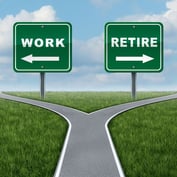Confidence in retirement security is up, according to EBRI’s 24th annual Retirement Confidence Survey, but the organization was reluctant to declare victory. Although more Americans reported feeling confident in 2014 than in the last five years, EBRI did not find they’re more prepared.
The survey found 37% of Americans are at least somewhat confident about their ability to retire comfortably, with 18% saying they are very confident, up from 13% last year. However, the percentage who said they were not at all confident is statistically unchanged at nearly a quarter, according to the report.
On the bright side (and not very surprising), the survey found confidence is higher among those who participate in a retirement plan, either through their workplace or in an individual account.
“When we compare the shifts in confidence between the 2014 and 2013 surveys, the increase in confidence was almost exclusively among those with a retirement plan,” Jack VanDerhei, research director for EBRI, said on a call discussing the results on Tuesday.
However, savings are still low and few respondents reported taking basic steps to prepare for retirement. The survey found 35% of workers have not saved any money at all for retirement, and only 57% are actively saving.
“Beyond participation in a retirement plan, there appeared to be no significant behavioral change to account for the change in confidence,” VanDerhei said. “Indeed, many clear warning signs about Americans’ lack of preparation for retirement have not changed. In aggregate, workers were no more likely to have done a retirement needs calculation, to have saved for retirement or to report savings amounts significantly larger than that captured in 2013.”
Greg Burrows, senior vice president of retirement and investor services for The Principal, spoke about the survey results in an interview with ThinkAdvisor on Monday. He noted how important it is for workers to assess what their actual retirement needs will be, rather than just guessing.
“One thing we look at is the percentage of workers using calculators, and still only about 44% use them, which means over half are still guessing at what their needs are,” Burrows said. “Amongst our clients and participants, we find that those who use retirement calculators, 40% of them take positive action and on average they’re saving about 40% more.”
Almost half of workers without a retirement plan said they were not at all confident about their retirement prospects, compared with about one-tenth of people who do have a plan.
Not only are those without a plan worried about their retirement, they’re not showing any improvement. Among workers who have a retirement plan, those who reported feeling very confident nearly doubled from 14% in 2013 to 24% this year, while those without a plan dropped one point to 9%.
The bad news keeps piling up for workers who don’t have a retirement plan. EBRI found that almost three-quarters of those who say they or their spouse don’t have a plan have less than $1,000 in total assets saved.
Burrows noted that percentage of workers with such meager savings has increased over the past five years by more than 50%. “There’s a disconnect between an awareness of the need to save versus the action behind the saving itself,” he said. “We’d recommend people really concentrate on understanding their expenses so they can make saving part of their lifestyle and they can think about savings as a consumption item to incorporate in their planning process.”
The worst part is workers know they need to save more. More than 20% of workers said they needed to save at least 30% of their income. Almost a quarter of those without a retirement plan said they needed to save at least 50% or that they had no idea how much they should be saving.
EBRI credited the confidence boost to market improvements.








 March 18, 2014 at 09:26 AM
March 18, 2014 at 09:26 AM










